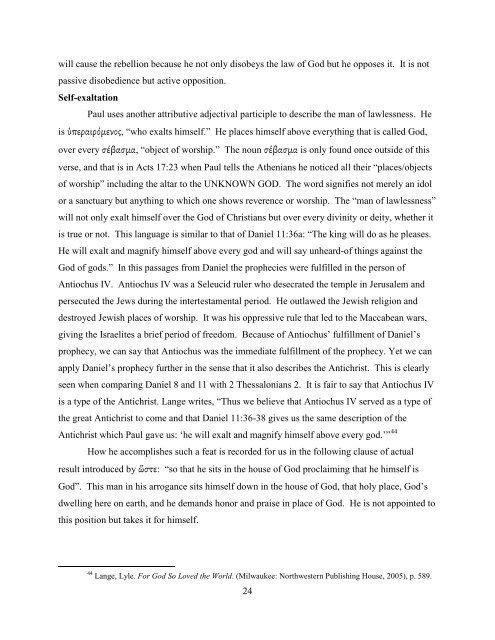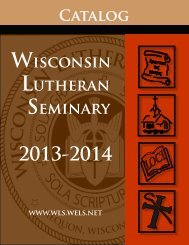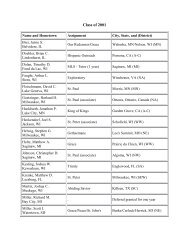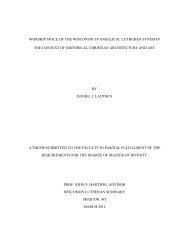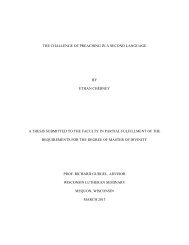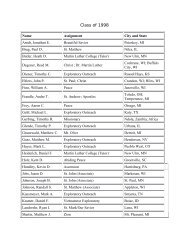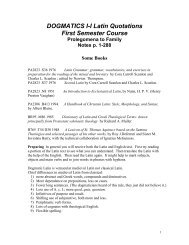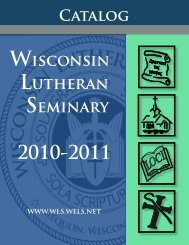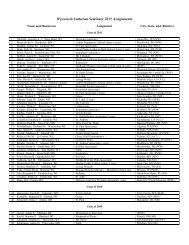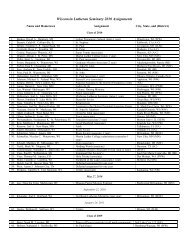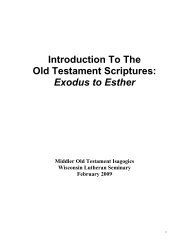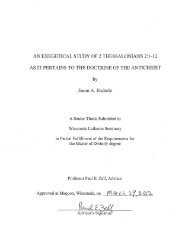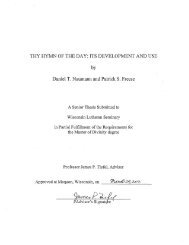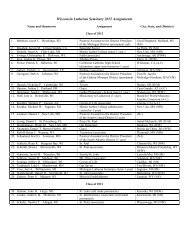Untitled - Wisconsin Lutheran Seminary - WELS
Untitled - Wisconsin Lutheran Seminary - WELS
Untitled - Wisconsin Lutheran Seminary - WELS
Create successful ePaper yourself
Turn your PDF publications into a flip-book with our unique Google optimized e-Paper software.
will cause the rebellion because he not only disobeys the law of God but he opposes it. It is not<br />
passive disobedience but active opposition.<br />
Self-exaltation<br />
Paul uses another attributive adjectival participle to describe the man of lawlessness. He<br />
is ὑπεραιρόμενος, “who exalts himself.” He places himself above everything that is called God,<br />
over every σέβασμα, “object of worship.” The noun σέβασμα is only found once outside of this<br />
verse, and that is in Acts 17:23 when Paul tells the Athenians he noticed all their “places/objects<br />
of worship” including the altar to the UNKNOWN GOD. The word signifies not merely an idol<br />
or a sanctuary but anything to which one shows reverence or worship. The “man of lawlessness”<br />
will not only exalt himself over the God of Christians but over every divinity or deity, whether it<br />
is true or not. This language is similar to that of Daniel 11:36a: “The king will do as he pleases.<br />
He will exalt and magnify himself above every god and will say unheard-of things against the<br />
God of gods.” In this passages from Daniel the prophecies were fulfilled in the person of<br />
Antiochus IV. Antiochus IV was a Seleucid ruler who desecrated the temple in Jerusalem and<br />
persecuted the Jews during the intertestamental period. He outlawed the Jewish religion and<br />
destroyed Jewish places of worship. It was his oppressive rule that led to the Maccabean wars,<br />
giving the Israelites a brief period of freedom. Because of Antiochus’ fulfillment of Daniel’s<br />
prophecy, we can say that Antiochus was the immediate fulfillment of the prophecy. Yet we can<br />
apply Daniel’s prophecy further in the sense that it also describes the Antichrist. This is clearly<br />
seen when comparing Daniel 8 and 11 with 2 Thessalonians 2. It is fair to say that Antiochus IV<br />
is a type of the Antichrist. Lange writes, “Thus we believe that Antiochus IV served as a type of<br />
the great Antichrist to come and that Daniel 11:36-38 gives us the same description of the<br />
Antichrist which Paul gave us: ‘he will exalt and magnify himself above every god.’” 44<br />
How he accomplishes such a feat is recorded for us in the following clause of actual<br />
result introduced by ὥστε: “so that he sits in the house of God proclaiming that he himself is<br />
God”. This man in his arrogance sits himself down in the house of God, that holy place, God’s<br />
dwelling here on earth, and he demands honor and praise in place of God. He is not appointed to<br />
this position but takes it for himself.<br />
44 Lange, Lyle. For God So Loved the World. (Milwaukee: Northwestern Publishing House, 2005), p. 589.<br />
24


